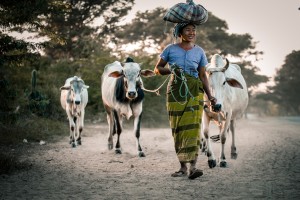
Geneva: Michelle Bachelet, United Nations High Commissioner for Human Rights, today told the Human Rights Council that in recent months, the situation in Myanmar had evolved from a political crisis to a multi-dimensional human rights catastrophe. Suffering and violence throughout the country were devastating prospects for sustainable development and raised the possibility of State failure or a broader civil war.
What had begun as a coup by the Myanmar military had rapidly morphed into an attack against the civilian population that had become increasingly widespread and systematic, Bachelet said. Offering statistics, she said nearly 900 people had been killed in the country while about 200,000 people had been forced to flee their homes as a result of violent military raids on neighbourhoods and villages.
“This crisis had compounded the already disastrous impact of COVID-19 on an economy that relied on remittances, the garment industry and other sectors shattered by global recession. A country-wide general strike combined with the widespread dismissal of civil servants – including educators and medical personnel – had incapacitated many essential services in the country,” Bachelet said.
Also read:
- US clamps new restrictions and vows to impose increasing costs on Burma’s military regime
- Villages set on fire by junta in Myanmar
The coup had exacerbated a number of long-running conflicts in Myanmar’s borderlands. She said fighting had resumed in Kachin, Kayin and northern Shan states, as well as other areas such as Chin and Kayah states that had been largely peaceful in recent years.
“Laws had been instrumentalised to stifle freedom of expression; curb independent media as well as social media; and arbitrarily detain at least 5,200 people,” she said and referred to over 90 journalists who had been arrested and eight major media outlets that had been closed.
The High Commissioner welcomed the release of 2,200 prisoners last week as a first step, but said that this should be unconditional and followed quickly by the many thousands still arbitrarily detained, including political leaders.
The military leadership had not successfully secured control of Myanmar, nor the international recognition it sought. On the contrary, its brutal tactics had triggered a national uprising that had changed the political equation. At the same time, Myanmar’s people had shown incredible resilience in organising systems of mutual solidarity and support. But despair was rising. Some people, in many parts of Myanmar, had taken up arms and formed self-protection groups.
“All armed actors must ensure that civilians and civilian structures were protected,” Bachelet said. Emphasising the continuing need to address the situation of the Rohingya, she said despite a tenuous ceasefire in Rakhine state, there had been no material change in the conditions that would be needed for any safe or sustainable return of refugees.
Speakers at the Council stated that accountability must be ensured to deter more atrocity crimes, reiterating their strong support to the mandate of the Independent Investigative Mechanism for Myanmar. The military coup was condemned strongly by speakers who emphasised that the international community must refrain from any measures that risked lending legitimacy to the military regime. A lasting solution must be found to the plight of both the Rohingyas in Myanmar, and the Rohingya refugees, ensuring their safe and dignified return.
Speakers said that inclusive engagement of human rights dialogue was key, calling on the international community to support the efforts of the Association of Southeast Asian Nations to break the impasse in the country, and welcoming the Five Point Consensus. Some speakers noted that the participation of concerned countries in the interactive dialogue was crucial, and the Council must follow the principles of universality, impartiality, objectivity and non-selectivity. All political prisoners must be released immediately and unconditionally, and the regime had to stop the use of lethal force and military weapons against civilians.
Sexual violence and the use of torture against detainees, as well as the detention of children, appalled speakers. The lack of humanitarian access and cross border humanitarian assistance to deliver aid to persons in need, and prevent further displacement, was concerning. Speakers deplored the continuous use by the police of excessive and lethal force against protesters. It was an outrage that broad restrictions on the media, Internet blackouts, public gatherings and other measures that curtailed freedom of expression and freedom of peaceful assembly remained in place. Women and girls bore the brunt of the junta’s repressive campaign; its long-established practice of using rape and sexual violence as weapons of war was well documented. Medical doctors who had joined protesters had been subjected to violence, disappeared and killed. Access to healthcare was limited in the country despite being urgently needed. The sovereignty of Myanmar lay with the people of Myanmar and their duly elected representatives, speakers emphasised.
Speaking were the European Union, Sweden on behalf of a group of countries, Pakistan on behalf of the Organization of Islamic Cooperation, Germany, Sierra Leone, Australia, Bangladesh, Indonesia, France, Spain, Japan, China, Maldives, Lao People’s Democratic Republic, United States, Saudi Arabia, Malaysia, Romania, Ireland, Timor-Leste, United Kingdom, Mauritania, Marshall Islands, Bulgaria, Netherlands, Philippines, India, Iran, and Ukraine.
The following civil society organizations also took the floor: Asian Forum for Human Rights and Development, Edmund Rice International Limited, Centre pour les Droits Civils et Politiques – Centre CCPR, and Article 19 – International Centre Against Censorship. Turkey, Greece, Armenia, and Azerbaijan took the floor in right of reply.
– global bihari bureau





